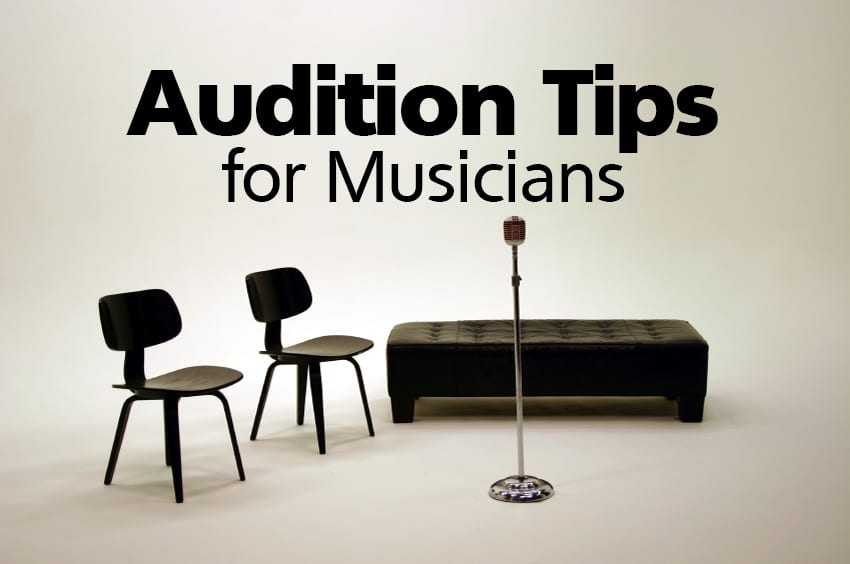Accomplish Your Musical Goals With Our Top Audition Tips
Whether you’re hoping to join a particular ensemble, secure a soloist position or land a first chair spot, we’re sharing three of our best audition tips for musicians.

A new school year/term is quickly approaching, and that means audition time for many of us! Whether you’re hoping to join a particular ensemble, secure a soloist position or land a first chair spot, we’re sharing three of our best audition tips for musicians.
You’ve chosen the perfect piece, spent weeks (or months) practicing, learned to control those pre-stage jitters, now all that’s left to do is step on out there and ace your audition. Even if you’re totally prepared there are things you can do to give yourself a little competitive edge come audition time. We’ll look at three awesome tricks that we’ve found to be successful, and we hope you share your words of advice in the comments section located after the article!
Create a Performance Cue
Like each of our audition tips, this piece of advice really may be applied to any performance situation. When the cards are on the table and you’ve done absolutely everything in your power to prepare, distractions still will pop up. The air conditioning turns on, an auditioner coughs, your shoelace inexplicably comes untied as you’re walking on stage even though you double-knotted (ahem, not that that’s ever happened to us). These tiny hiccups can turn into major concentration busters in a high-pressure situation like an audition.
That’s why we suggest that you create and practice a performance cue. Think of your cue as a mantra you can repeat in your head to both keep what you must remember top-of-mind and block out distractions. The easiest way to determine your performance cue is to consider the very best times you played your audition piece. What one thing did you do differently during those run-throughs? That will be your mantra. For example, say you tend to rush your pace during a specific passage. Your performance cue may be “take your time, listen.” Or, if you sometimes find yourself hitting the keys too hard for a delicate melody, you might consider “soft fingers, look ahead.” Keep your cue short and to the point, its purpose is to be simple and narrowed, and be sure to practice your cue while rehearsing.
Don’t Neglect Visual Communication
Unless you’re participating in a blind audition, there are going to be people watching you perform. One widely reported on study , conducted by concert pianist and social psychologist
Chia-Jung Tsay in 2012, found that when presented with musical competition audio only, video only or video & audio, people are more likely to determine the winner by video alone.Now, this isn’t to say that style trumps substance when it comes to auditions, but it does indicate that if all other factors are equal, style can give you a competitive edge. The best way to ensure your visual communication is spot-on is to video record yourself rehearsing. Work on communicating your engagement with, and passion for, the music. This can be done with gentle (read: NOT over the top) head movement, facial expressions and eye contact (if your piece is memorized).
Another consideration is dressing the part. When appropriate, try to choose attire that matches the mood of the piece you’re auditioning with. If it’s an intense number, pick an outfit that conveys energy. If it’s a dreamy aria, wear something more subdued.
Don’t Be a Robot
It’s impossible to over-stress the importance of practice prior to a big audition or performance. However, sometimes during the process of mastery, we tend to get a bit robotic with our delivery. For this reason, we should perform mindfully. (Just as we practice mindfully. Read more about mindful practice here.)
A research paper published in The Psychology of Music describes a study in which an orchestra was asked to play the same piece twice. The first time, the orchestra was instructed to offer subtle new nuances to the piece during their performance. The second time, the group was told to simply play the piece as well as they could. Both the orchestra members and audience preferred the first version of the piece, in which subtle distinctions were made, thus suggesting the piece was being played mindfully. You certainly don’t want to improvise during your audition, but try loosening up a bit in rehearsal, and take small risks. Sometimes, if executed correctly, those small risks can pay off big in the end!
[divider type=”thin” spacing=”10″]
Do you have other tips to share with your fellow auditioners? Is there one thing, in particular, that you think gives you a competitive edge? Share your suggestions and expertise with us in the comments section!

